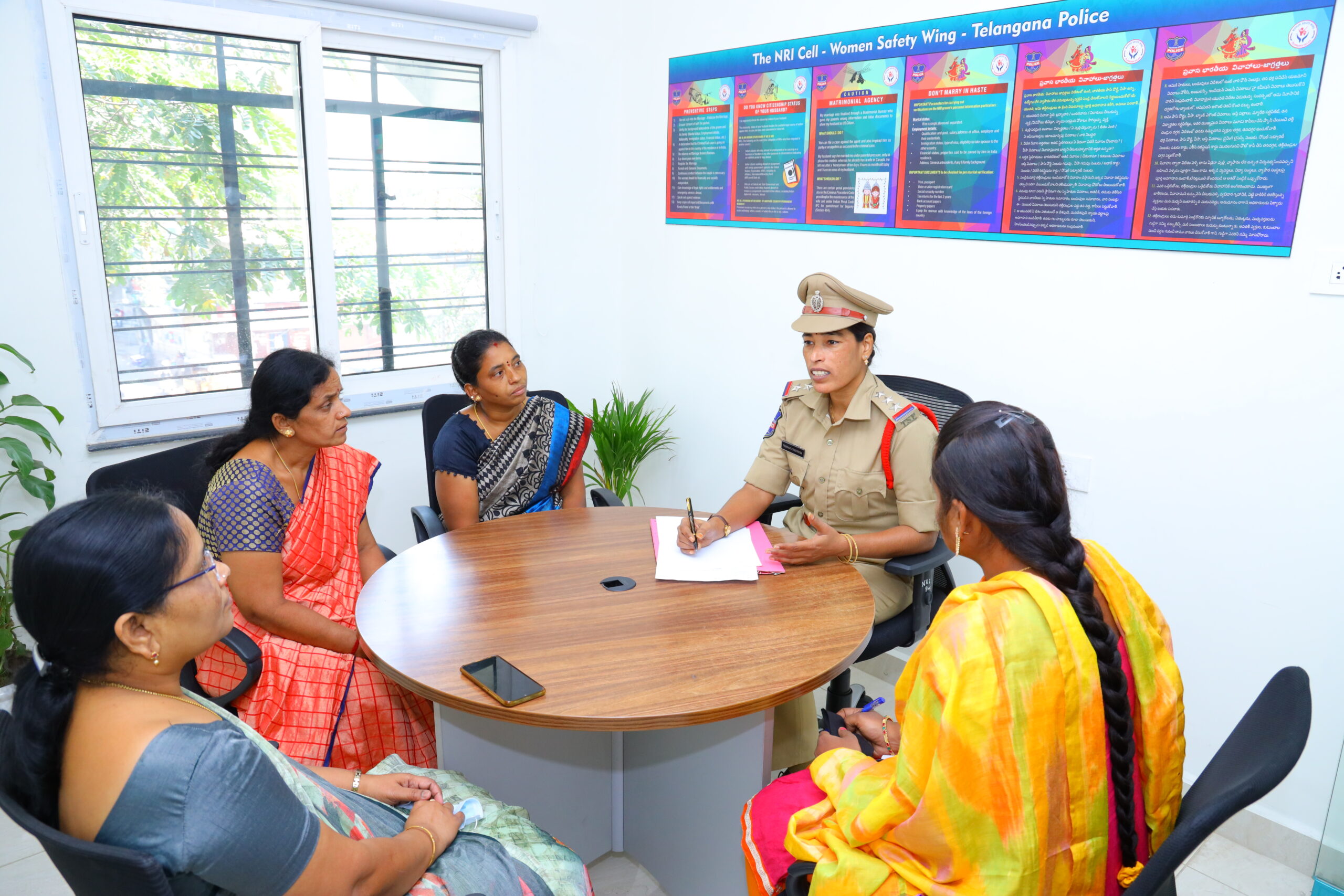NRI Cell
Safety Across Boundaries
The NRI Cell of the Women Safety Wing is established to deal with cases wherein NRI spouses or relatives are cited as accused. The main objective is to help the distressed women deserted by NRI spouses in liaison with stakeholders like Embassies, the National Commission for Women, Ministry of External Affairs amongst many others. This cell will act as a platform to share the victims suffering and help them with all possible legal guidance. The cell is empaneled with legal experts to provide assistance to the victims in filing domestic violence and maintenance cases.

We are here to help
Reach out to us
When can I approach NRI Safety Cell?
ABOUT NRI CELL
NRI Women Safety Cell was formed on 17.07.2019 & inaugurated by Sri M. Mahendar Reddy, IPS, DGP, Telangana State at Women Safety Wing, Telangana State Police, Hyderabad. We intend to provide legal guidance with the support of Network of International legal activists (NILA), an NGO to the aggrieved women in NRI marriage with the support of various stakeholders. We guide the SHOs during investigation of cases related to harassment of NRI spouses/relatives. Training to impose investigative procedures and related documentation is given to the SHOs.
We ensure speedy disposal of pending trial cases by producing the witnesses and execution of NBWs. Suggestions of Legal Experts are taken during the investigation, filing charge sheet and during trial depending on necessity for speedy justice to the victims/complainants of the NRI cases. Coordination platform is envisaged for stakeholders i.e MEA, GAD (TS), RPO, NGOs, Consulates of foreign countries and panel of experts to get the accused back to India.
Composition of NRI Cell
NRI Cell is headed by a Dy. Superintendent of Police who works in tandem with a Police Inspector and 2 Police constables.
How NRI Cell Works

Collect details of registered cases
We collect the details of the cases registered against NRI spouses/relatives across the state. We receive the petitions from the complainants who approach our office.

Case details and status
After receiving the petition, the office collects the information regarding the case and its status from the complainant as well as from the investigating officer by contacting over phone.

Review
As per instructions of the officers, I.Os will be asked to attend the review at the office in presence of the panel of experts.

Fulfill investigation gaps
After review, instructions will be given to the I.Os to fulfil the gaps during the investigation.

Stakeholders
We liaison with the Stakeholders like NCW, MEA, MHA, GAD TS, and RPO.

Follow up
We also collect the information of cases being registered across the state and follow up the status of LOCs and NBWs against the NRI accused.to analyze and to help the victims by understanding the case scenarios.
NRI Cell Monitors
- Issuing / renewal of Look Out Circulars (LOCs)
- Filing charge sheet, obtaining CC Number and Non-bailable Warrants (NBWs) immediately.
- Letters to Hon’ble court / Regional Passport Officer (RPO) for impounding of Passports.
- Letters to the employer of the accused.
- Letter to Secretary, General Administration Department (GAD), TS through the office.
- Letters to Foreigners Regional Registration Officers (FRRO) where required.
- Guiding I.Os to request court registrar to send request to MHA for execution of NBW/accused summon against accused abroad.
- Follow up the requests received from National Commission for Women (NCW)/ Telangana State Commission for Women (TSCW).
NRI Marriage - Do's and Don'ts
- Do not rush into the marriage
- Publicize the marriage
- Verify the background of the groom and his family
- Do not rely on marriage brokers/bureaus
- Register the marriage
- Gain awareness of legal rights, entitlements and emergency services abroad
- Keep copies of important documents such as VISA, passport with family/friend of bride
It is important to know the citizenship and marriage status of your husband. The citizenship status of your husband decides the available legal recourse against him.
You can file a case against the agent and also implead them as accused in the criminal case along with the husband and in-laws.
We have compiled this ready reckoner on precautions. Click here to download the handbook.
Common scenarios in which case can be registered
- Bride deserted in a foreign country without any support or a valid visa.
- Bride physically and mentally tortured in the foreign country and either forced to flee or forcibly sent back.
- Bride reaches foreign shores and realizes that her husband is already married.
- Bride’s survival in a foreign country made dependent on continuous payment of dowry.
- Bride denied maintenance in India on the basis of a foreign decree of divorce.
- Bride shocked to see ex- parte decree of divorce obtained against her.
- Bride initiated criminal procedures only to realize that the attendance of her husband cannot be procured by Indian courts.
- Bride realizes that her consent to marry has been obtained using unfair means like false information of immigration status, job etc.
- Bride, who approaches the court, encounters numerous technical obstacles relating to jurisdiction, service of summons, execution of orders etc.
FAQs
The court can issue Warrants and also declare your husband a Proclaimed offender.
ISSUANCE OF WARRANTS
Sections 70 to 79 of the Criminal Procedure Code pertain to issuance of warrants by the criminal court. A Warrant may also be issued by the Court in lieu of and in addition to summons where the Court has reason to believe that the Accused would not obey the summons.
PROCLAIMED ABSCONDER
In the event the warrant is not executed against the accused /husband who resides outside India, the Court is empowered to publish a written proclamation requiring him to appear at a specific place and at a specified time not less than thirty days from the date of publishing such proclamation under Section 82 of the Cr.P.C. The court may also direct attachment of the movable and immovable property of the Offender is ordered by the Criminal Court which is seized of the matter.
In the case of Smt. Neeraja Saraph versus Shri Jaynant Saraph, the Supreme Court suggested the need to consider legislation safeguarding the interests of women. It suggested three specific provisions namely:
1. No marriage between a NRI and an Indian Woman, which has taken place in India, may be annulled by a foreign court.
2. Provision may be made for adequate alimony to the wife in the property of the husband both in India and abroad.
3. The decree granted by Indian courts may be made executable in foreign courts both on the principle of comity and by entering into reciprocal agreements like section 44A of the Civil Procedure Code which makes a foreign decree executable as it would have been a decree passed by the court.
Issue notice under Sec.91 Cr.P.C to the complainant requesting to produce documentary evidence i.e., Marriage Registration Certificate, Wedding Invitation and Photographs of Marriage, Property transferred sale deeds, status of the Passport & visa, travel documents, details of the employer and addresses of the accused in abroad and India which are useful for the purpose of investigation.
1. In the situation that if the Passport/visa renewal is near future, letter can be addressed to RPO, Sec’bad with a request to hold the renewal of the Passport/visa of the accused.
2. Letter can be addressed to NRI Cell, National Commission for Women, New Delhi which review the petitions and take action, narrating the facts of the case with a request to take steps to revoke the Passport of the accused.
3. Letter can be addressed to FRRO, Shamshabad to know the arrivals and departures of the accused to India.
- I.O/victim can address a letter to the Passport Officer by enclosing FIR copy and NBW copy with a request to impound or hold the Passport.
- I.O/victim can address a letter to the NRI division National Commission for Women with a request to revoke the Passport.
- I.O can file a letter through Public Prosecutor before the Hon’ble Court concerned with a request to issue directions to the Passport officer for passport impounding of the accused.
The following are the addresses are National Commission for Women, New Delhi (ncw@nic.in & dsnri@mea.gov.in) and Regional Passport Officer, Secunderabad (rpo.hyderabad@mea.gov.in).
Any person who has reason to believe that the act of Domestic Violence has been or is being or is likely to committed to may give information about it to the Protection Officer who appointed by the State Government. The Dist.Protection Officer make a domestic incident report and send to the Magistrate in such a form and in such a manner as may be prescribed, if the aggrieved persons, who desires, claiming relief for issuance of protection order. The victim or the protection officer or any other person on behalf of victim may present an application to the Magistrate seeking for relief U/s 12 of Domestic Violence act. Then, the Protection Officer verifies and file a Domestic Incident report to the Magistrate concerned for consideration. The copy submitted by the applicant to the Dist. Protection Officer and report of the Protection Officer to the Magistrate concerned are enclosed.
Try to open a bank account in the country of residence, so that you can withdraw money in emergency and be financially independent. Read and understand the laws of the foreign country and your rights there, especially against any form of abuse or neglect, including ill treatment, domestic violence, how to get residence permit, etc. Keep in touch after marriage on phone and email with friends and relatives in the foreign country. Wherever it is possible, learn the language of the country you reside in after marriage.
In the case of Smt. Neeraja Saraph versus Shri Jayant Saraph in 1994, the Supreme Court suggested the need to consider legislation safeguarding the interests of women. It suggested three specific provisions namely:
i. No marriage between an NRI and an Indian woman which has taken place in India, may be annulled by a foreign court.
ii. Provision may be made for adequate alimony to the wife in the property of the husband both in India and abroad.
iii. The decree granted by Indian courts may be made executable in foreign courts both on the principle of comity and by entering into reciprocal agreements like section 44A of the civil procedure code which makes a foreign decree executable as it would have been a decree passed by the court.
First you can contact your family, relatives and friends both in Indian and foreign country and seek their help, advice or assistance. The Indian Mission through their empanelled NGOs, local community welfare associations can assist in filing a case approaching NGOs, contacting your family or seeking legal advice. List of NGOs empanelled with High Commission / Consulate General of India in foreign countries is on the link http://moia.gov.in/writereaddata/pdf/list_indian_women.pdf. You may contact them to seek assistance.
You can ask for a recourse to Look-out-Circular (LOC) to be issued by the investigating agency in cognizable offences under IPC or other penal laws, when the overseas husband is deliberately evading arrest or not appearing in the trial court despite NBWs (Non Bailable Warrants) and other coercive measures and there is a likelihood that he will leave the country to evade trial or /arrest.

